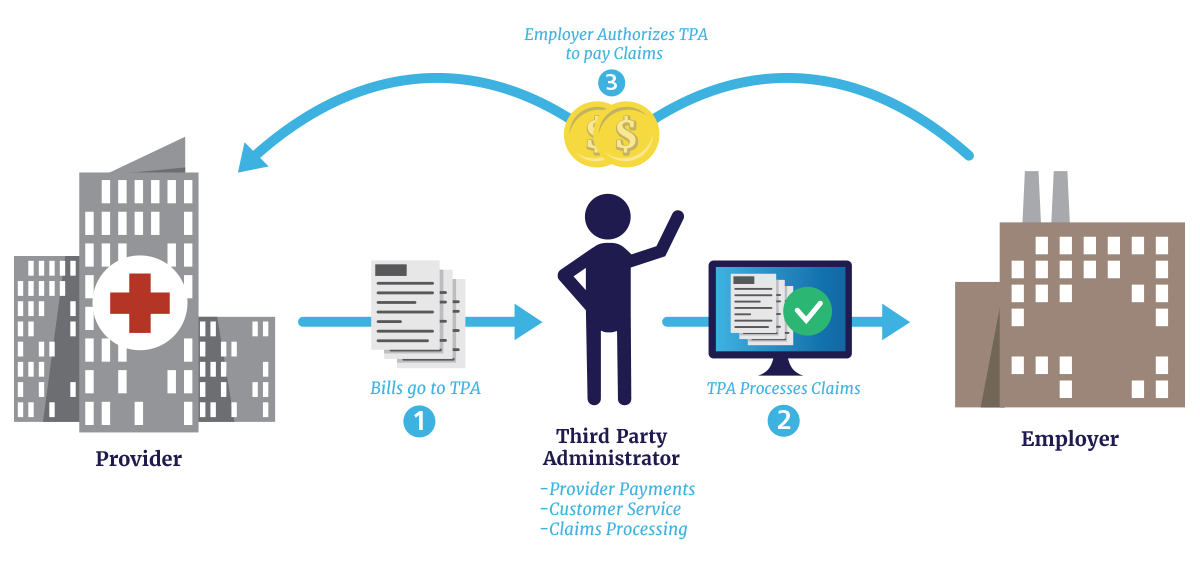Compensation packages offering ‘health benefits’ are coming with escalating price tags. A growing number of companies have discovered self-funded health plans add value in cost savings and more.
In basic terms, self-funded health benefit plans (also referred to as self-insured and self-funding) are a health plan strategy where an employer pays member health claims directly to health providers, rather than paying premiums to a health insurance company to cover those claims.
Companies choosing to use self-funded plans bypass the traditional health insurance model and instead work with a Third Party Administrator (TPA) in establishing, administering and managing the plan.
How does a self-funded health plan work?
It’s not a complicated process. Companies considering self-funded health plans typically hire a TPA to provide the expertise in developing and administrating a customized plan. Working with a TPA, an employer is able to provide benefits, paying health providers directly only as needed and fixed administrative costs monthly to their TPA. This model represents significant cost savings to a company’s bottom line.
A traditional health insurance plan is built within a business model established by health insurance companies and involves an employer paying monthly premiums covering the projected claims, administrative costs and more to their insurance provider. The insurance company pays plan providers and keeps any unspent dollars as profit.

Why should I self-fund my healthcare plan?
Self-funding represents a variety of benefits to consider –
- Self-funded plans represent a competitive option offering substantial savings for employers.
- Plans can be customized to meet specific company needs.
- Self-funding is regulated on a federal level and often is exempt from state mandates.
- Self-funded administration regulates plan reporting that provide insights and influences strategic decisions of employers.
- Self-funded plans offer a greater sense of financial control for employers.
- As regulations overseeing fully insured health plan requirements evolve, the advantage of customization attributes of self-funded health benefit plans increases.
Self-Funded vs. Fully Insured
Self-Funded Health Benefit Plans
- Improve cash flow by eliminating pre-paying (insurance premiums) for healthcare coverage.
- Customize your benefits to meet specific organization goals and avoid paying for unnecessary healthcare coverage.
- Monthly audits of claims provided, enabling organizations to make adjustments to coverage throughout the year.
- Access to customized monthly claim reports providing plan insight and influencing strategic decisions and control for employers.
- Federally regulated healthcare plan options ensure consistency in benefit administration across geographical locations.
Fully Insured Health Benefit Plans
- Select from a variety of ‘one-size-fits-all’ plans through healthcare insurance provider regardless of past claim history.
- Pre-pay healthcare claim expenses with consistent monthly payments regardless of the number of employee claims.
- Minimal access to detailed reporting specific to an organization’s healthcare costs and claims history.
- Premium rates are fixed annually and change only when the number of employees enrolled changes.
- Regulated by each state which may lead to conflicting benefit mandates and laws as well as potential health insurance premium taxes
Frequently Asked Questions
Q: How much risk is involved with self-funding?
A: No one can predict the future when it comes to health and that uncertainty is the risk. Most TPA’s setup what is known as a Stop-Loss insurance policy that protects the employer from unexpected or catastrophic costs.
Q: How beneficial are claim reports provided by a TPA?
A: Federal regulations require TPA’s to track and provide reports to clients. These
company-specific reports are updated regularly and contain actionable information that can identify cost savings, guide plan customization and wellness strategy of an employer.
Want to Learn More?
Additional SmartSheet topics are available on the Educational Resources page.